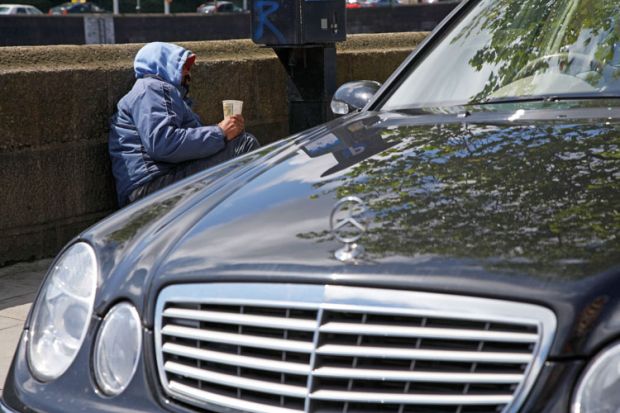In M People’s 1993 hit Moving On Up, Heather Small sings “just who do you think you are?” over and over again. It stuck in your head.
M People, short for “Mike’s people”, were formed by a Manchester DJ who brought musicians together to create something better than one person could do alone. Sociologist Mike Savage has played a similar role in academia. This book is his collaborative take on who’s been moving on up, and who’s been moving on down, in the UK, and where exactly “up” and “down” are.
The core of the book is an analysis of the 2011 Great British Class Survey of 161,000 people by the BBC and its online team. It is an analysis hampered by the survey’s non-random sampling. To illustrate just how non-random it was, 20 times more CEOs filled it in, per CEO, than did the rest of the UK population.
Either CEOs are especially obsessed with themselves, or people quite like pretending to be CEOs in surveys on class, or maybe both. At a recent meeting of UK universities’ CEOs (vice-chancellors), a group was asked to put up their hands if they had filled in the BBC’s class survey. A majority had. So perhaps those at the top really are unusually self-obsessed. Graduates of the universities of Oxford and Cambridge were twice as likely to have taken this survey as graduates of any other university.
Many people in the UK are interested in class, especially the elite. According to this book, as many as one in 16 people in the UK qualify as elite. By the survey’s own terms, this “elite” had an average household income of £89,000 a year, equivalent to a couple both being paid £25 an hour working full-time. As the survey measured not only economic but also social and cultural capital, it means that these respondents also had the “right” combination of cultural interests.
With sample surveys, even those as large as this one, researchers always find it hard to discriminate those at the very top from those just beneath them, often lumping “master” and “higher-ranking subordinate” together. Taxation and other data on a near-majority of the population are needed to identify how the actual elite, on pay rates of £100 or even £1,000 an hour, differ so much from those paid four or even 40 times less. Money matters; only when the UK is a far more equitable country could people on the equivalent of £25 an hour become members of the actual elite, rather than merely high-ranking officials doing the bidding of those at the top. Savage argues: “We need to bring those at the very top more directly into view. It is fundamental here to question the extent to which their mushrooming economic capital can be justified.” But mixing those at the top with those earning £25 an hour, and calling everyone in this disparate group an elite, can obscure our view of the top.
Before taking up his post at the London School of Economics, where he is now co-director of its International Inequalities Institute, Savage spent 15 years in Manchester, so he is well placed to contrast North and South. Class is not simply your relation to the means of production, or a quantity that can be determined for you when you answer a few survey questions. It is also who you think you are. The analysis by Mike’s people is strongest where class is described as being “under your skin”. And what is most interesting about the bias in this survey is not the over-sampling of the apparently successful, but the under-sampling of those with the least. People don’t want to have their apparent failure to aspire confirmed.
What the book highlights clearly is the dominance of London, of London’s universities and Oxbridge, and the growing importance of housing wealth. Class in the UK has become a geographical process. A non-London urban elite hardly exists any more. “Manchester men” (as they were once called) are of almost no significance, according to this analysis. The North is the home of the precariat, and is the end destination of those being socially cleansed from London, those who are least likely to fill in online BBC surveys.
We are all products of where we come from. In 1993, Bedrock, two producers who share Savage’s and M People’s Manchester connections, released the track For What You Dream Of. “When the taking and the giving starts to get too much,” sings Carole Leeming, “not all God’s children have the same chances.” The song ends by asking us to “remember the future”.
The taking and the giving have got too much. Surveys, culture, writings and so many readings are all pointing the same way, to show that life chances are diverging. Class in the 21st century is very different from class in the 20th century. But if we remember the future, we can change class again.
Danny Dorling is Halford Mackinder professor of geography, University of Oxford, and author of Inequality and the 1% (2014).
Social Class in the 21st Century
By Mike Savage, with Niall Cunningham, Fiona Devine, Sam Friedman, Daniel Laurison, Lisa Mckenzie, Andrew Miles, Helene Snee and Paul Wakeling
Pelican, 480pp, £8.99
ISBN 9780241004227 and 9780141978925 (e-book)
Published 12 November 2015
POSTSCRIPT:
Print headline: Just who do you think you are?
Register to continue
Why register?
- Registration is free and only takes a moment
- Once registered, you can read 3 articles a month
- Sign up for our newsletter
Subscribe
Or subscribe for unlimited access to:
- Unlimited access to news, views, insights & reviews
- Digital editions
- Digital access to THE’s university and college rankings analysis
Already registered or a current subscriber?




